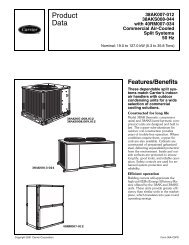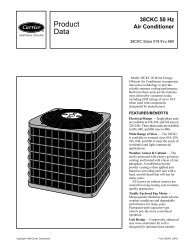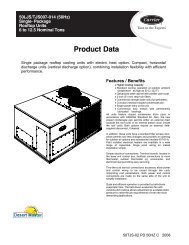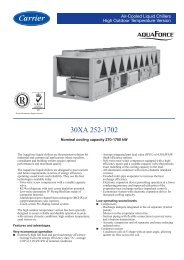STULZ (Precision Air Conditioning)
STULZ (Precision Air Conditioning)
STULZ (Precision Air Conditioning)
You also want an ePaper? Increase the reach of your titles
YUMPU automatically turns print PDFs into web optimized ePapers that Google loves.
Greater efficiency thanks to free cooling with outside air<br />
Economical precision air-conditioning systems also make use of<br />
cool outside air for indirect cooling of the data centre. Modern<br />
control electronics only switch on energy-intensive compressor<br />
cooling when really necessary. It continuously monitors the<br />
climate in the data centre and selects the optimum operating<br />
mode in no time.<br />
Operation of cooling compressors and fans in the air-conditioning<br />
system is particularly energy-intensive. Electronic control<br />
improves the response in changing load conditions, while<br />
additional cooling with indirect free cooling keeps the running<br />
time of the compressor to a minimum.<br />
Greater effectiveness through precise air conduction and<br />
even power distribution.<br />
A thermographic image visualises the hot and cold zones in the data centre, as on a<br />
weather map. This provides you with an early warning system of conditions in the<br />
air-conditioning system that may increase consumption.<br />
To ensure that the cooled air gets to where it is needed, professional<br />
planning of the air conduction and careful configuration<br />
of the server racks is part of every good climate control<br />
concept. Hot and cold aisles, raised floors and cover panels<br />
convey the cooled air to the computer with precision. For<br />
example, particularly economical systems make use of closed<br />
air circuits, which feed the waste heat from the server racks<br />
directly back to the air-conditioning unit via closed air ducts.<br />
Optimum air distribution in a data centre<br />
Hot aisle<br />
Cold aisle<br />
7
















